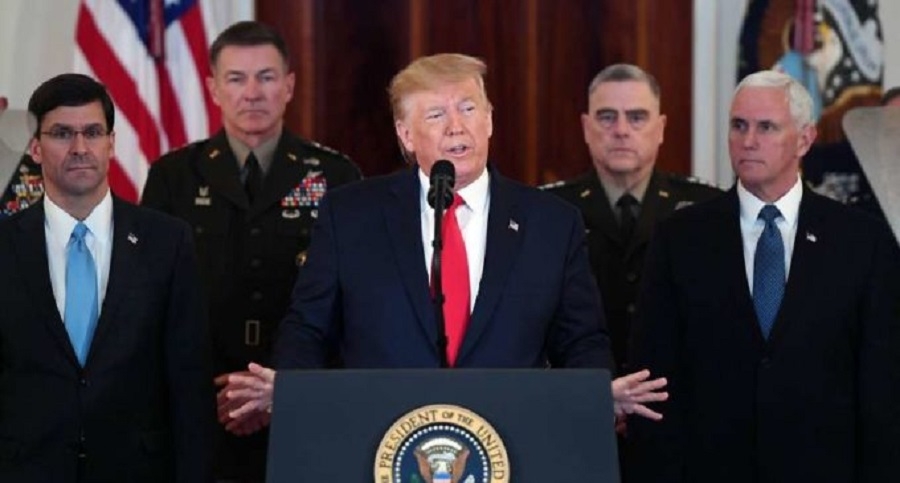US, Iran step back from the brink; region still on edge
| Date :10-Jan-2020 |

WASHINGTON :
American troops including a quick-reaction force on high alert
THE US and Iran stepped back from the brink of possible war on Wednesday as President Donald Trump signalled that he would not retaliate militarily for Iran’s missile strikes on Iraqi bases housing US troops. No one was harmed in the strikes, but US forces in the region remained on high alert. Speaking from the White House, Trump seemed intent on deescalating the crisis, which spiralled after he authorised the targeted killing last week of Iran’s top General, Qassem Soleimani.
Iran responded overnight with its most direct assault on America since the 1979 seizure of the US Embassy in Tehran, firing more than a dozen missiles at two installations in Iraq. The Pentagon said Wednesday that it believed Iran fired with the intent to kill. Even so, Trump’s takeaway was that “Iran appears to be standing down, which is a good thing for all parties concerned and a very good thing for the world.” Despite such conciliatory talk, the region remained on edge, and American troops including a quick-reaction force dispatched over the weekend, were on high alert. Last week Iranian-backed militia besieged the US Embassy in Baghdad, and Tehran’s proxies in the region remain able to carry out attacks such as the one on December 27 that killed a US contractor and set off the most recent round of hostilities. Hours after Trump spoke, an ‘incoming’ siren went off in Baghdad’s Green Zone after what seemed to be small rockets “impacted” the diplomatic area, a Western official said.
There were no reports of casualties. General Mark Milley, the chairman of the Joint Chiefs of Staff, warned that it was “perhaps too early to tell” if Iran will be satisfied that the missile strikes were sufficient to avenge the Soleimani killing. “We should have some expectation,” Defence Secretary Mark Esper added in a Wednesday briefing, “that Shiite militia groups, either directed or not directed by Iran, will continue in some way, shape or form to try and undermine our presence there,” either politically or militarily.
There is no obvious path to diplomatic engagement, as Trump pledged to add to his “maximum pressure” campaign of economic sanctions. He said that the new, unspecified sanctions would remain in place “until Iran changes its behaviour.” Iran’s Supreme Leader Ayatollah Ali Khamenei said that the overnight strike was not necessarily the totality of Iran’s response. “Last night they received a slap,” Khamenei said. “These military actions are not sufficient (for revenge). What is important is that the corrupt presence of America in this region comes to an end.” Trump, facing perhaps the biggest test of his presidency, credited the minimised damage to an early warning system “that worked very well” and said Americans should be “extremely grateful and happy” with the outcome. The strikes had pushed Tehran and Washington perilously close to all-out conflict and left the world waiting to see whether the American President would respond with more military force.